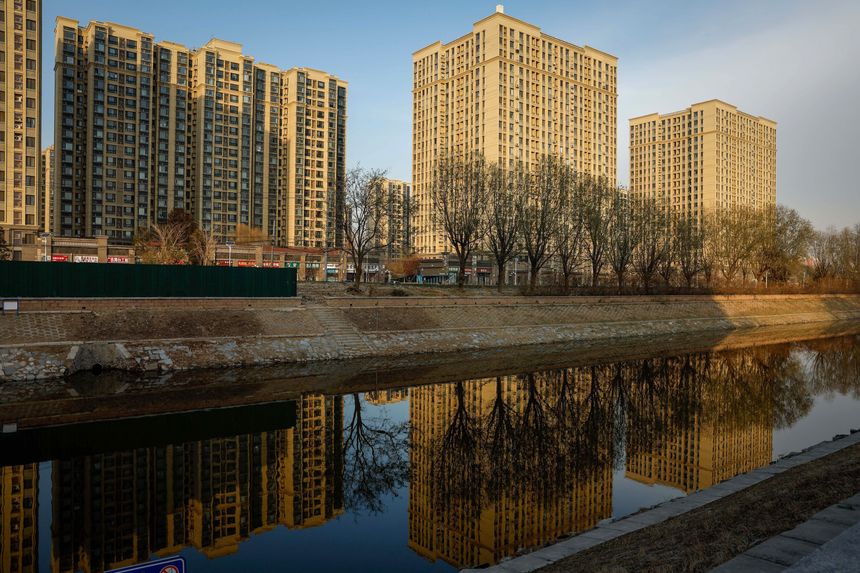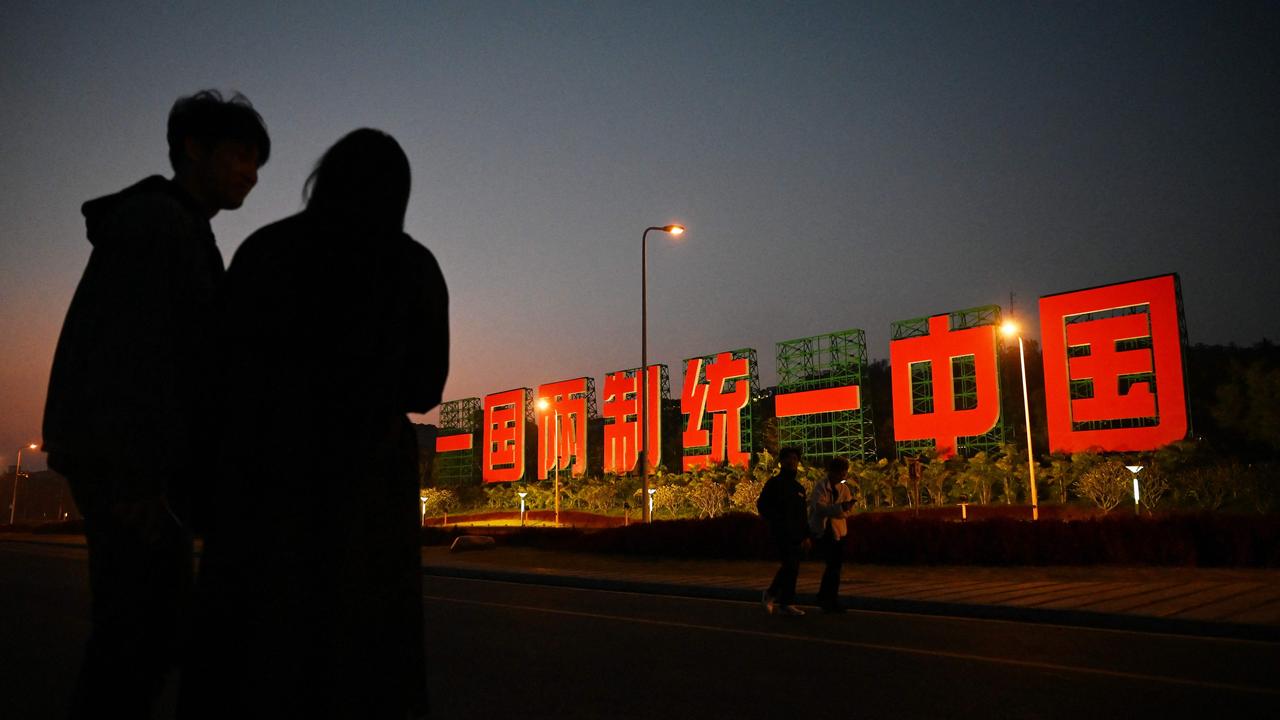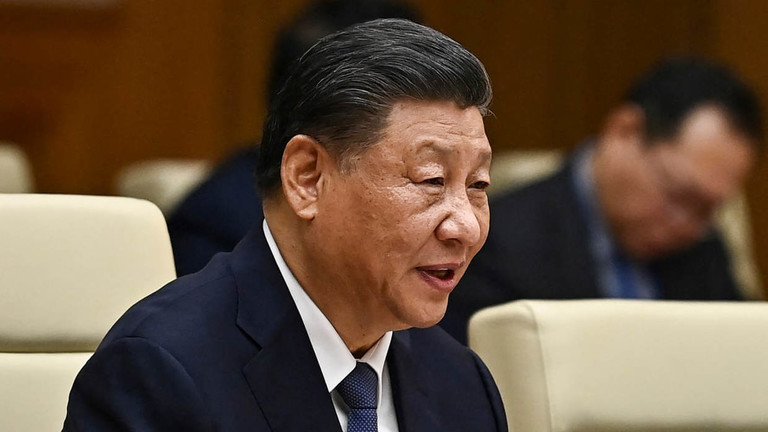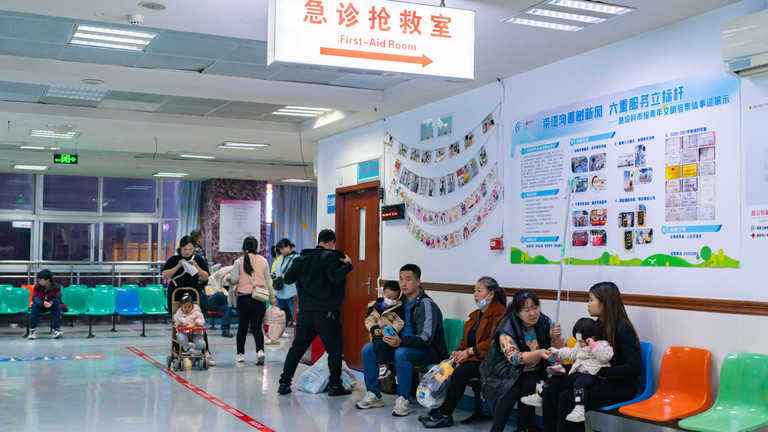This article is more than
1 year oldIt’s official: The era of China’s global dominance is over
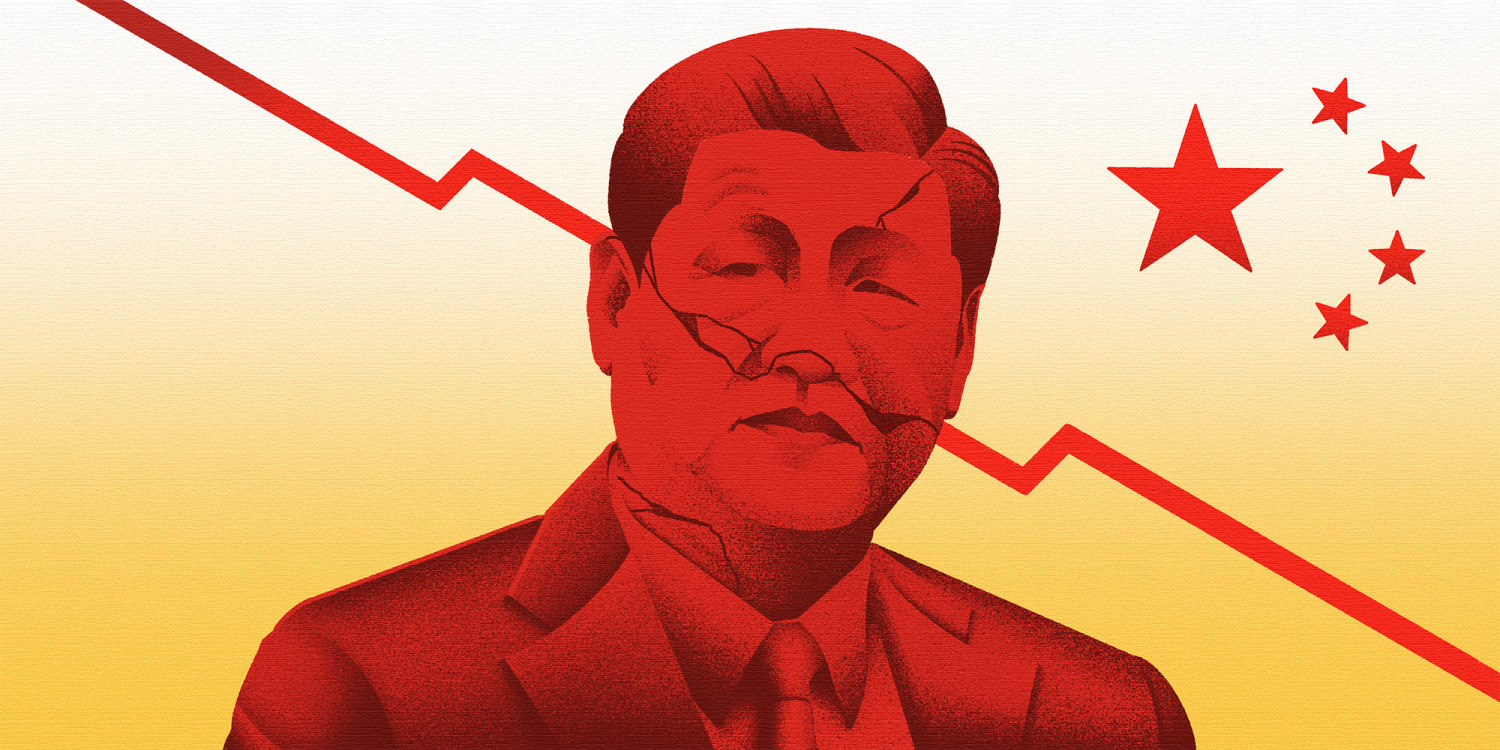
|
For the past three decades, China has been on the upswing of a supercycle that saw an almost uninterrupted expansion of the country's capacity to manufacture, appetite to consume, and ability to project power across the world economy. The Chinese Communist Party relentlessly pursued economic development over all else, even when that single-mindedness pushed the party to make debilitating policy mistakes — creating a massive bubble in the property market, saddling provinces with loads of debt, and failing to transition away from an overreliance on investment. There was no time to stop for corrections while China's mind was on money alone. This era of expansion was not only a boon for Beijing, it also helped fuel global demand. Countries relied on China's hunger for speedy modernization and industrial might to supercharge their own development. Even American companies saw China as the next great global market — and made bets accordingly. They lost those bets. China's leader, Xi Jinping, has shifted the CCP's raison d'être to national security over the economy. Getting rich isn't China's big project anymore; the project is power. As a result, both the government's priorities and its behavior have changed. In the past, whenever it seemed that a recession was on the horizon, the CCP came to the rescue. There's no hefty stimulus coming this time. Nor will the explosive growth that experts once expected from China return. Beijing's relationship with the outside world is no longer guided by the principles of economic rationality, but rather by its yearning for political power. "This isn't about the economy anymore, it's all about advanced technology and weaponry," Lee Miller, the founder of the Chinese economic surveyor China Beige Book, told me. In response, American businesses need to consider how else Beijing's decision-making may now be flipped on its axis. For everyone from American farmers to pharmaceutical companies, this means shrinking demand and unstable supply chains. For policymakers, it means a China that is harder to mollify when conflicts arise. For the rest of us, it's a more precarious world. A spent economic system The Chinese economy has been bending under the weight of its structural problems for almost a decade now, but since the end of Xi's COVID-lockdown policy, it's become clear that its growth model is well and truly broken. Beijing's story so far has been to claim that, like other economies on the mend from the pandemic, China will in time resume its normal growth pattern. Instead, it looks like the economy is falling behind. Let's start with the country's real-estate market, the importance of which cannot be overstated. Not only is it the biggest source of wealth for Chinese households, real estate is also the mechanism through which local governments are financed. Instead of property taxes, municipalities sell large swaths of land to property developers and then use the revenue for basic social services like fixing roads and paying out pensions. Cities like Shanghai and Beijing get a lot of attention, but they make up just a fraction of the property market. Property firms did the most building in third-tier cities where people aren't as wealthy. This is where you'll find China's infamous ghost cities. It's been clear for years that the Chinese real-estate market has been in trouble. China has a population of 1.4 billion, but it has built housing for a population of 3 billion, according to expert estimates. Many of the mega-developments became empty monuments to Beijing's insatiable desire for growth. In Shenyang, farmers have taken over a development of empty mansions for cattle grazing. Worried that the sector would implode, Beijing attempted on multiple occasions to limit the credit that was fueling the bubble. But because real estate played such a vital role as a government-funding mechanism, China had to keep building, despite these troubles. Authorities didn't want to change the way local governments funded themselves or allow Chinese household finances to crumble, so they could not let prices fall. That credit addiction remains. China Photos/Getty Images But this system, supported by speculation and easy money, is starting to break down. Country Garden, China's largest real-estate developer, is on the brink of collapse. In a sign that Beijing has grown tired of this game, Xu Jiayin, the chairman of Evergrande, another embattled real-estate behemoth, has been detained by authorities. Money-starved provinces are being forced to ask for bailouts — which the federal government doesn't want to give — and sell assets that the local governments claim are illiquid. The country's massive, opaque shadow-banking sector, which served as the backbone for the real-estate boom, is also under pressure. At least one $87 billion money manager, Zhongrong Trust, skipped payments to investors this summer, sparking protests. "We've not been in a situation where so many developers are defaulting and consumers are questioning whether or not they should prepay for an apartment," Charlene Chu, the managing director and senior analyst at Autonomous Research, told me. "Before they were thinking, 'Prices are rising so fast, I need to get in.' Now prices are declining and the urgency to buy has vanished, so they're waiting." Official data has shown relatively modest price declines so far, but like a lot of official economic data coming from Beijing these days, it's hard to take those numbers seriously. Private data shows prices falling by 15% in metropolises like Shenzhen and Shanghai. In tier-two and tier-three cities, prices have fallen by as much as 50%, according to Bloomberg. "Eighty percent of all sales by area are in tier-three and below cities," Chu said, adding that many of these places are facing long-term structural problems. "If their market doesn't come back, the entire market doesn't come back." Little fires everywhere all at once The real-estate sector is the most visible sign of China's fading star, but other key parts of the economy are showing strain as well. While the rest of the world is battling inflation, China is still in deflationary mode. August CPI came in at 0.1%, up from minus-0.3% the month before, showing an overall lack of domestic demand. Exports — which make up 40% of the country's GDP growth — hit their lowest level in three years in July, falling 14% from the same time a year before. August export figures showed some improvement but still came in down 8.8% from the year before. Overall, Autonomous expects China's exports to slow 8% compared to last year. Chu — who has been called the "rock star" of Chinese debt analysis — told me that this weakness is not just a result of a cyclical downturn; it's a part of a more permanent shifting of supply chains caused by trade tensions with Europe and the US. These are powerful forces that are not easily reversed. Once multinational corporations no longer see China as a source of steady growth, they could begin changing their plans to invest. At the same time, domestic anxiety about shrinking employment may change the basic consumer behavior that powered China's rise. This can create a vicious, self-reinforcing cycle that keeps investment out and spending low. The authorities are playing a game of whack-a-mole, trying to contain any shocks to the financial system because they fear social instability.
Victor Shih, an associate professor and the director of the 21st Century China Center at the University of California San Diego, told me that when people ask him if there will be a financial crisis in China, he tells them that China "is constantly in a financial crisis." It's like the authorities are playing a game of whack-a-mole, trying to contain any shocks to the financial system because they fear social instability. That means there can be no correction, but if there's no correction, there's no deleveraging, and if there's no deleveraging, the moles will only multiply. Zombies in the Middle Kingdom The economy has put Beijing in a bind. There's too much for the Chinese Communist Party to do, and not enough money or time to do it. Allowing a property-market correction, bailing out local governments, creating a new funding mechanism for them, developing a social safety net for the people through all this instability — all of it costs money. And even if the capital were there, policymakers fear what this disruption could do to their grip on power. Falling property prices and shrinking exports would weigh on the Chinese people's wealth, and the government is concerned that a meaningful correction would cause unrest. "Every time there are severe property-price declines, Beijing views it as a risk to social stability," Chu said. Plus, Beijing may need to conserve its firepower for other concerns coming down the pipeline. In the long term, the CCP has to worry about China's demographics. Thanks to government mandates like the one-child policy, the country's population is rapidly aging — and even started to decline in 2022. The workforce will soon begin shrinking: Right now there are three working-age adults for every retired person in China, according to data compiled by J Capital Research, and by 2050, that ratio will hit one to one. Without booming property prices or continued growth, the growing pool of retirees will put a heavy burden on China's threadbare social safety net. GDP per capita is about $12,800. When Japan started struggling in 1991 with a similar dynamic — aging population, sky-high debt, and slowing growth — its GDP per capita was more than triple that amount, at $41,266 in today's dollars. China will get old before it gets rich, placing the task of growing the economy on fewer and fewer people as time goes on. Getting rich isn't China's big project anymore; the project is power.
Unless dramatic action is taken, the future of China's economy is looking less like a young dynamo and more like an old, slow-moving blob. Last week, Bloomberg reported that policymakers are considering a modest $137 billion stimulus — just enough to meet its already comparatively low annual growth target, and nothing in the way of reform. "There are healthy parts of the economy, it's just the zombie parts that have to be dealt with," Shih said. "It doesn't look like they are doing that now, but it will be a bigger and bigger drag on growth. I think the slow growth will cause such a serious employment and capital-flight problem, there could be political instability." But again, that's could, not will. And because its priority is now power — where gains are much more idiosyncratic — it's a risk that Beijing has shown it is willing to take. A new, more dangerous era The idea that Chinese policymakers connect political stability and economic growth is dogma in the West, but what we're witnessing now suggests that's not the case — at least not in practice. Beijing has not spent money on — or talked about raising money for — social programs for its aging population, nor has it made any attempts to tackle the cost of living for young families. If economic modernization was the most important thing, these would have been on the docket years ago. But they're not. Policymakers don't want an implosion, but they're not pushing for warp-speed development anymore either. "All the policies are now determined by Xi Jinping himself, and his priorities are spending money to engage in a technology and national-security race with the US," Shih explained. Lintao Zhang
"If we're talking about the economic relationship between the US and China, there just isn't that much going on," China Beige Book's Miller told me over the phone. "The worry we have is not that Chinese consumers will do even less. It's that all the global supply chains are intermixed in industries like pharmaceutical and green tech. If things get too tense, it's potential supply-chain snarls that coil and screw up US business." Miller told me that multinational corporations were not only unsure of where to go next but also were lacking full transparency as to China's impact on some supply chains. "It's not just that we have a problem," he said, "it's that we don't even know how big the problem is." China has never been a big consumer of American imports, but certain sectors will get hurt as our trade relationship is reset. A faltering Chinese economy will suppress demand for commodities like oil seeds and grain, hitting US farmers especially hard. It will also eat into corporate profits for companies such as Nike and Starbucks that made large bets on Chinese consumers. US restrictions on technology exports — created to counter new national security concerns — threaten the more than $50 billion of revenue that US chipmakers generate selling to China. Wall Street doesn't have to go home, but it can't stay here. The Wall Street Journal has reported that foreign executives are jittery about visiting China, afraid they'll never be allowed to leave. The great traveling circus that is hot money and adventure capitalism is already scouring the world for its next opportunity in countries like Mexico and Vietnam. These are forces bigger than Beijing. Earlier this month, the House select committee on China competition held a hearing in New York City, calling on witnesses to describe what risk looks like with a Chinese Communist Party that's less committed to the free flow of capital and more concerned with flexing its muscles within its region. In her testimony, Anne Stevenson-Yang, the founder of J Capital Research, said that the US — especially its Midwest industrial heartland — isn't invested in China because of market demand. It's invested there for the outsourcing of mechanical goods and labor. For the US economy, China as a workshop is much more important than China as a consumer. Companies will need to scour their supply chains for vulnerabilities and consider their exposure accordingly. When Beijing is focused on national security, rules can change at the drop of a dime. Foreign businesspeople who once sought efficiencies going in may find it cumbersome to get out. "The biggest risk there is the currency," Stevenson-Yang explained. "As companies make more money and want to move it to the US, they run into currency controls and they might not be able to get dollars out." It's time to imagine a future where China does not become rich but may remain powerful — building its army and continuing to develop its domestic technological capabilities. History has shown that economic privation need not impede China's technological achievement. During the depths of the Maoist purges, the CCP was still able to develop the atomic bomb, the hydrogen bomb, and its own intercontinental ballistic missiles. Xi has warned China to prepare for "great struggles" on the road to glory. Now that China's economic supercycle is over, that may be the cycle we're about to witness. It will be a painful adjustment. Correction: October 15, 2023 — An earlier version of this story misstated the defense budgets of China and the United States. They are about $700 billion and $800 billion, respectively, not $700 million and $800 million. Linette Lopez is a senior correspondent at Insider. About Discourse StoriesThrough our Discourse journalism, Insider seeks to explore and illuminate the day’s most fascinating issues and ideas. Our writers provide thought-provoking perspectives, informed by analysis, reporting, and expertise. Read more Discourse stories here. |
Keywords
Newer articles
